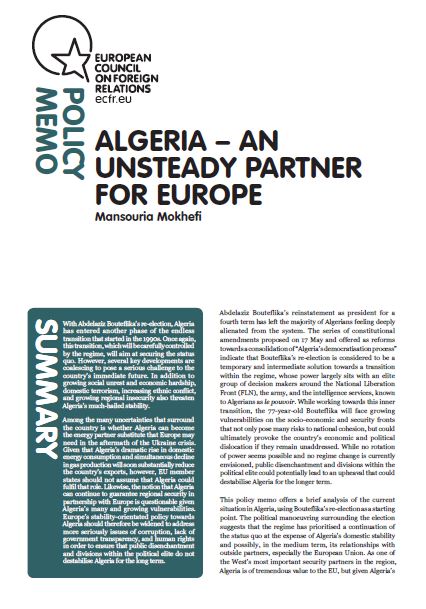Algeria – an unsteady partner for Europe
EU approach to Algeria neglects long-term domestic stability
The EU’s relationship with Algeria is short-sighted because it favours security at the expense of long-term domestic stability and does not take into account the implications of the regime’s human rights abuses, according to this policy paper. Although Algeria is the EU’s third largest supplier of natural gas, it will remain an “unreliable partner” for Europe unless it manages to implement domestic reforms.
The paper suggests that – despite promised constitutional reforms – the recent re-election of Abdelaziz Bouteflika for a fourth term as President does not offer any serious prospect of improved governance, economic growth, democracy or transparency.
ECFR author Mansouria Mokhefi points out that Europe’s policy towards Algeria “indicates the EU’s willingness to continue to accommodate the current regime despite fundamental disagreements with some of its domestic policies” but that the EU’s leverage is limited and Algeria’s attitude continues to be one of caution and sometimes distrust.
With over 80 percent of its gas exports going to Europe, the EU has been looking increasingly to Algeria as it seeks to reduce its energy dependence on Russia following the Ukraine crisis. However Mansouria Mokhefi points out that an EU “gas pivot” to Algeria is complicated by two factors:
- Algeria’s leadership may not be willing to jeopardise its growing links with Russia
- Algeria’s increasing domestic energy consumption and declining gas production has reduced its gas exports
Algeria’s opposition parties remain weak, divided and unable to present a credible alternative to the regime. Algeria’s reputation in the eyes of EU partners is being damaged by a series of social, economic and security challenges:
- Over-dependence on oil and gas income
- Widespread poverty and inequality
- Bloated state sector, inefficient banking system and bureaucracy
- High unemployment and widespread corruption
- Ethnic conflicts and terrorism threat from Al-Qaeda in the Islamic Maghreb (AQIM)
Mansouria Mokhefi writes that the EU has been slow to react to these mounting challenges and lacks a proactive and comprehensive strategy to deal with them. She recommends that the EU builds on its positive image amongst most Algerians and considers investing in civil society.She adds, “ [Algeria] will not forget who supported their endeavours towards democracy and who supported the regime’s allies. Precisely because Algeria has become so essential to the security of the region however, its Western partners have been reluctant to press the regime on issues of importance that relate primarily to democracy and human rights”.
The author concludes “As one of the West’s most important security partners in the region, the EU needs Algeria. But given Algeria’s many challenges and its insufficient responses to them, it may not be capable of being the kind of security partner that Europe wants.”
Mansouria Mokhefi is Special Advisor for the Middle East and North Africa at Institute français des relations internationals (ifri) and teaches at New York University in Paris.
The European Council on Foreign Relations does not take collective positions. ECFR publications only represent the views of their individual authors.



